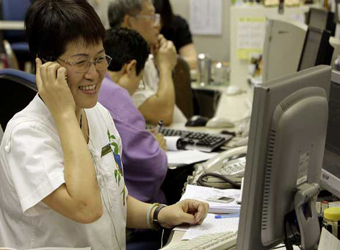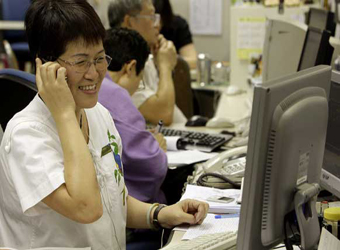Asian stocks closed higher on Friday following news that U.S. President Donald Trump had agreed to meet North Korean leader Kim Jong Un. The move also tracked moderate gains seen on Wall Street following the implementation of U.S. metals tariffs.
President Donald Trump would meet with North Korean leader Kim Jong Un by May, South Korean National Security Office chief Chung Eui-yong said. South Korean envoys had hand-delivered a letter from Kim to Trump on Thursday U.S. time.
The meeting was confirmed by the White House and in a subsequent tweet by Trump, who said that “great” progress was being made. He added that sanctions would “remain until an agreement is reached.”
The Trump administration’s acceptance of North Korea’s invitation sets in motion the most significant development in years of intermittent negotiations about the North’s nuclear weapons program.
Still, experts were ambivalent on whether or not the meeting, the details of which have not been confirmed, would result in anything substantial on the matter of denuclearization.
Japan’s Nikkei 225 closed higher by 0.47 percent at 21,469.20 after earlier recording gains of more than 2 percent on the news. The broader Topix index gained 0.32 percent.
Meanwhile, South Korea’s Kospi advanced 1.08 percent to close at 2,459.45 as tourism-related stocks got a boost from the latest geopolitical development. Retailer Lotte Shopping jumped 7.09 percent and cosmetics company Amorepacific advanced 4.45 percent.
Elsewhere, Hong Kong’s Hang Seng Index rose 0.96 percent by 3:05 p.m. HK/SIN. On the mainland, the Shanghai composite edged up by 0.58 percent to close at 3,307.64 and the Shenzhen composite added 1.56 percent to end at 1,885.38.
Small cap names on the mainland outperformed, with the ChiNext start-up board rising 3.05 percent. The blue chip CSI 300 saw slighter gains of 0.78 percent.
Sydney’s S&P/ASX 200 edged up 0.34 percent to finish at 5,963.20 as most sectors traded in the green, with the exception of energy stocks and gold producers. The heavily weighted financials sector rose 0.74 percent on the day.
Ahead, markets will turn their focus to the release of U.S. nonfarm payrolls data during U.S. hours.
Markets stateside closed with moderate gains after Trump signed tariffs on steel and aluminum imports that exempted Canada and Mexico. The move, which takes effect in 15 days, will result in tariffs of 25 percent and 10 percent on steel and aluminum, respectively.
Earlier in the week, Gary Cohn, the Trump administration’s top economic advisor, resigned from his post following the announcement last week that those tariffs would be implemented.
Steel producers in Japan underperformed gains on the benchmark on those developments. The Topix Iron & Steel sub-index declined 0.94 percent, with JFE Holdings and Kobe Steel down 1.49 percent and 3.21 percent, respectively.
Meanwhile, South Korea’s Posco lost 3.63 percent and Hyundai Steel declined 2.48 percent.
Elsewhere, the European Central Bank on Thursday dropped its easing bias, fueling expectations that the central bank would move towards normalizing monetary policy.
In currencies, the dollar index, which tracks the greenback against six peers, firmed to trade at 90.165 by 2:52 p.m. HK/SIN.
The move higher also came as the euro’s overnight decline on the back of what analysts perceived as dovish comments from ECB President Mario Draghi. The common currency was mostly steady at $1.2316, a touch above its overnight low of $1.2296.
Oil prices edged up after sliding more than one percent overnight. U.S. West Texas Intermediate futures tacked on 0.15 percent to trade at $60.21 per barrel. Brent crude futures added 0.22 percent to trade at $63.75.
The Bank of Japan kept its policy steady on Friday, which was in line with expectations. In a Reuters poll, most economists indicated they expected the central bank to keep its long-term rate target steady in 2018.
“Actual policy tweaks in terms of asset purchases or yield-curve control settings remain some way off, but words can be very powerful,” ANZ Research analysts said in a morning note.
Source: CNBC


